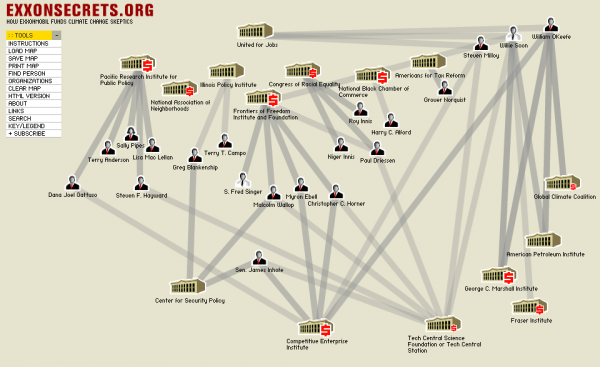
New York’s State Attorney has opened an investigation into whether ExxonMobil lied to the public and investors about the risks of climate change and funded outside groups to question climate science, even as the company’s own expert researchers found that fossil fuel emissions do, indeed, contribute to rising temperatures.
The Exxon investigation reflects the broader politicization of climate change and the role of corporations in shaping public perceptions. Surveys have found that the U.S. public is poorly informed about the science of climate change. A climate change countermovement flush with funds from business and conservative organizations works to create skepticism and distort public understanding. These efforts mirror other controversies over science and risk, and past corporate campaigns to create doubt about the harmful impacts of chemicals such as tobacco, DDT, or holes in the ozone layer.
- Robert J. Brulle. 2014. “Institutionalizing Delay: Foundation Funding and the Creation of U.S. Climate Change Counter-Movement Organizations.” Climatic Change 122(4):681–94.
- Thomas Dietz, Paul C. Stern, and Robert W. Rycroft. 1989. “Definitions of Conflict and the Legitimation of Resources: The Case of Environmental Risk.” Sociological Forum 4(1):47–70.
- Riley E. Dunlap and Peter J. Jacques. 2013. “Climate Change Denial Books and Conservative Think Tanks: Exploring the Connection.” American Behavioral Scientist 57(6):699–731.
- Valerie J. Gunter. 2005. “News Media and Technological Risks: The Case of Pesticides after ‘Silent Spring.’” The Sociological Quarterly 46(4):671–98.
- Naomi Oreskes and Erik M. Conway. 2010. Merchants of Doubt: How a Handful of Scientists Obscured the Truth on Issues from Tobacco Smoke to Global Warming. New York: Bloomsbury Press.
Climate change denial is not simply the result of well funded public relations campaigns, however. It also reflects collective and individual anxieties and the difficulties of coming to terms with abstract and long-term risks. Everyday experiences, cultural norms, political beliefs, and religion shape how people come to terms with problems like climate change.
- John H. Evans and Justin Feng. 2013. “Conservative Protestantism and Skepticism of Scientists Studying Climate Change.” Climatic Change 121(4):595–608.
- Kari Marie Norgaard. 2011. Living in Denial: Climate Change, Emotions, and Everyday Life. MIT Press.
- Min Zhou. 2015. “Public Environmental Skepticism: A Cross-National and Multilevel Analysis.” International Sociology 30(1):61–85.
For more on echo chambers and how climate change denial narratives gain credibility, check out this new piece over at Contexts!

Comments 1
Klimaya — December 14, 2015
Can I found any details about this subject in different languages?